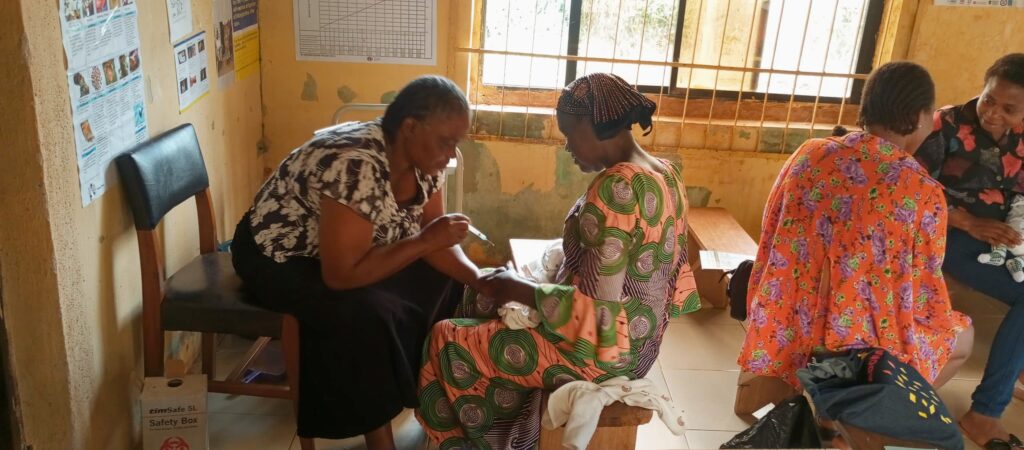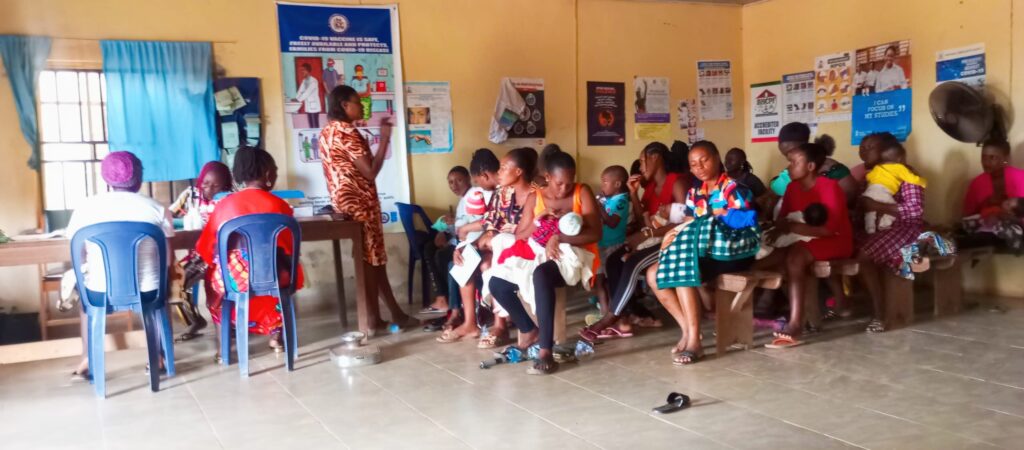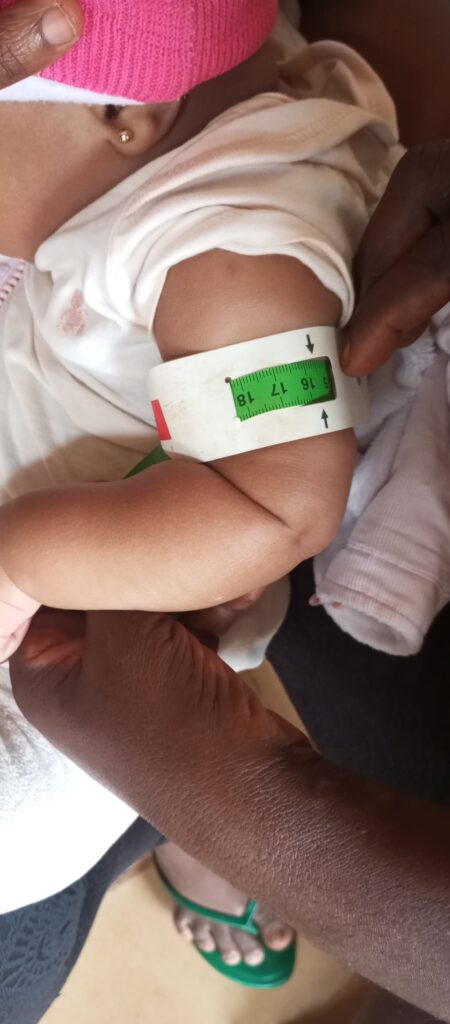“How can we feed our babies only breast milk when we barely eat?”
Rural mothers in poor communities face numerous challenges to breastfeeding, from cultural myths to limited access to support. Health workers’ guidance can be a game-changer, demystifying misconceptions and empowering mothers to make informed choices. With the right support, breastfeeding becomes a powerful tool for improving infant health and nurturing a brighter future.
By Precious Nwonu
ENUGU, Nigeria.
It was 11:00 am on a cold, rainy Wednesday morning when a group of mothers and nursing mothers gathered at the health center in Okabike Village, Akwuke, Enugu South Local Government Area, to immunize their children. The waiting room hummed with the soft cries of babies wrapped tightly in thick wrappers, as their mothers tried to keep them warm from the biting chill. As they waited their turn, a health worker stepped forward to give a brief health talk, her voice rising gently above the murmurs and whispers.
She spoke about hygiene, nutrition, and caring for newborns, but when she mentioned “exclusive breastfeeding,” a ripple of reactions spread through the room. Some women looked confused, others frowned, and a few began to talk amongst themselves in frustration. “It’s too hard,” one woman said out loud. “How can we feed our babies only breastmilk when we barely eat?” The room echoed with murmurs of agreement and doubt.
One of the women who looked particularly lost was Happiness, a young first-time mother from Akwa-Ibom, cradling her 7-month-old baby. She spoke up in Pidgin English, “I no know wetin be exclusive breastfeeding,” she admitted. She had heard the term before during her antenatal visits but never really understood it. The health workers at her center mostly spoke in Igbo, and she didn’t speak or understand the language well. “I just dey sit down dey look whenever dem dey talk,” she said.
Happiness didn’t tell anyone she couldn’t understand because she felt too shy to speak up. Her quiet confusion reflected a larger issue – language barriers and poor communication during health education sessions that leave many women uninformed and unsupported. Another young mother, 22-year-old Ogechi, was also puzzled. As soon as the health worker mentioned exclusive breastfeeding, she turned to the woman beside her and whispered, “Gịnị bụ exclusive breastfeeding?” – asking in Igbo what the term meant.

In Ugwuaji community, 13.8km away from Akwuke, similar patterns repeated themselves. Ruth Nwobodo, a mother of three, shared that she deliberately didn’t practice exclusive breastfeeding. “I know about it,” she said, “but I don’t eat well. If I don’t eat, how will my breastmilk be good for the baby?” So, she gave her baby formula from three months. Ruth believed that breastmilk was only healthy if the mother ate well.
The root of the issue is clear: many young mothers don’t truly understand the importance or meaning of exclusive breastfeeding. Exclusive breastfeeding means feeding a baby only breastmilk for the first six months of life, with no water, formula, or food – except for medications or vitamins when needed. Yet, in Nigeria, this simple but powerful practice remains poorly understood.
On the other hand, Mirable, a mother of two knew the benefits of exclusive breastfeeding but struggled to stick to it, stopping at five months despite knowing its benefits. Often, behind such decisions, is a complex mix of fatigue, poor nutrition, poverty, societal pressures, the notion of sagging breasts, and lack of support. Without regular check-ins and encouragement from health workers, many young mothers like Mirable falter.
According to the National Demographic and Health Survey (NDHS), the rate of exclusive breastfeeding improved slightly from 29% in 2018 to 34% in 2023 but dropped again to 29% in 2024, far below Nigeria’s goal of 50% by 2025. Research shows that increasing exclusive breastfeeding rates can reduce under-five mortality and save billions of dollars in GDP losses.
Onoh Carolyn, a seasoned health educator, dispelled breastfeeding misconceptions with conviction. “Breastmilk is the perfect food for babies – economical, clean, and easily digestible,” she said, emphasizing its numerous benefits.

“With infectious enthusiasm, Onoh Carolyn, a veteran health educator, debunked common breastfeeding myths with straightforward facts. ‘Breastmilk is the ultimate baby food – affordable, hygienic, and perfectly tempered,’ she explained, highlighting its ease of digestion. As she spoke, her passion shone through, emphasizing the profound bonding experience during breasting between mother and child, and the trust that develops through eye contact. With a warm smile, she offered practical tips, like gently tapping the baby’s mouth to discourage nipple biting, while also underscoring the numerous health benefits for both mom and baby, from uterine recovery to enhanced brain development.
She also emphasized the importance of training health workers to communicate complex health ideas to young mothers in ways that are easy to understand.
Consequences of Poor Breastfeeding Habits
The consequences of low exclusive breastfeeding rates are dire. Babies introduced to water or food too early face increased risks of diarrhea, malnutrition, and infection.
Research reveals that a mere 10% increase in exclusive breastfeeding rates in Sub-Saharan Africa could save thousands of lives and billions of dollars. Yet, the region struggles with alarmingly low rates – only 34% of infants under six months are exclusively breastfed, despite accounting for 57% of global under-five deaths.
Health workers like Onoh believe training is key to reversing this trend. “We need to educate health workers so they can empower mothers with kindness, respect, and facts,” she said. When health workers understand the importance of breastfeeding, they teach it with passion, creating a ripple effect of knowledge and care that benefits entire communities.
Meanwhile, initiatives like immunization and nutritional monitoring using mid-upper arm circumference tools help track children’s health, identifying those at risk of malnutrition and providing critical interventions. By prioritizing health education and community-based care, we can protect the next generation and build a healthier future.


Bursting the Myth
Onoh sets the record straight on a common myth: that young mothers can’t breastfeed if they’re not eating enough. She clarifies the misconception, emphasizing that breastfeeding is not directly tied to food quantity, but rather to frequency, technique, and support. “When a mother doesn’t have enough food to eat, it can make breastfeeding feel even harder, she may feel tired, weak, and worried that she’s not producing enough milk — even though her body still makes what the baby needs.
In reassuring young mothers in particular who find themselves in poor economic situations, many health workers understand this struggle and often say: “We know you’re hungry, and that’s not fair, but even in tough times, your breast milk is still the best and safest food for your baby. We’re here to support you.”
Ono recommends that “When a mother is battling with the economy after exclusive breastfeeding, we recommend simple, affordable, and locally available foods like beans, eggs, crayfish, and small fish like sardines or dried fish (panla), Eba, fufu, yam, pap (ogi), rice, to help restore nutrients lost during breastfeeding and also fruits like bananas, oranges, mangoes, pawpaw, and watermelon help with hydration and provide essential vitamins like Vitamin C and A. They should always drink water to stay hydrated every time).”
Renowned pediatrician Emeritus Professor Bede Ibe highlighted the unique nutritional and protective qualities of breastmilk. “Breastmilk contains high protein and anti-infective properties,” he explained. “It protects the baby from diarrhea.” He advised mothers who cannot afford formula after six months to use locally sourced complementary foods.
The problem is not just awareness but understanding and support. Many young and first-time mothers face pressure from family, misinformation, or their own fears. Improving exclusive breastfeeding in Nigeria requires changing the system: training health workers better, using local languages in health talks, involving men and families in the conversation, and fighting harmful myths. When a mother understands why breastfeeding matters – and feels supported to do it – she is more likely to stick with it, and that choice can change a child’s future.





Comments